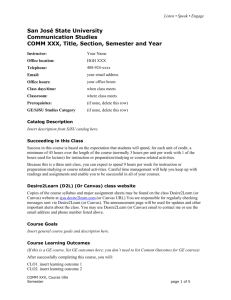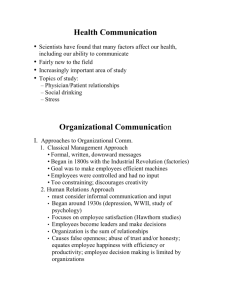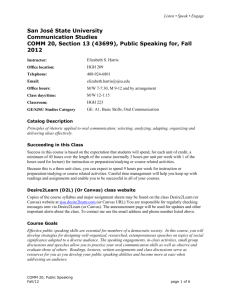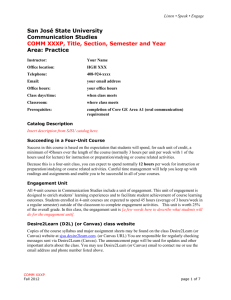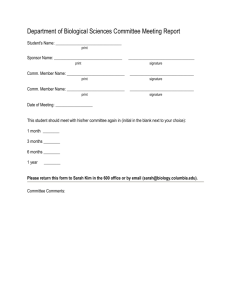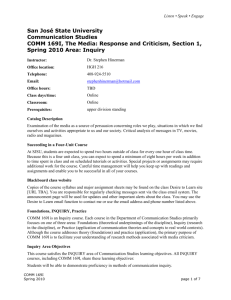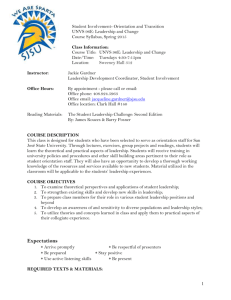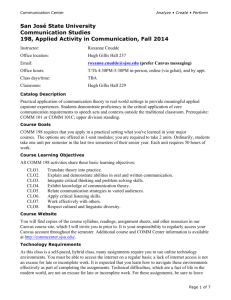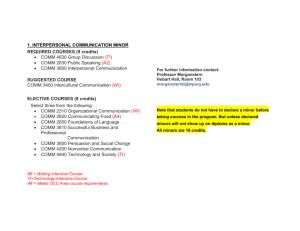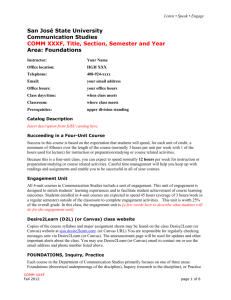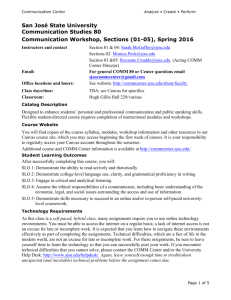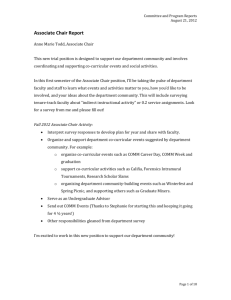Course Learning Objectives - San Jose State University
advertisement
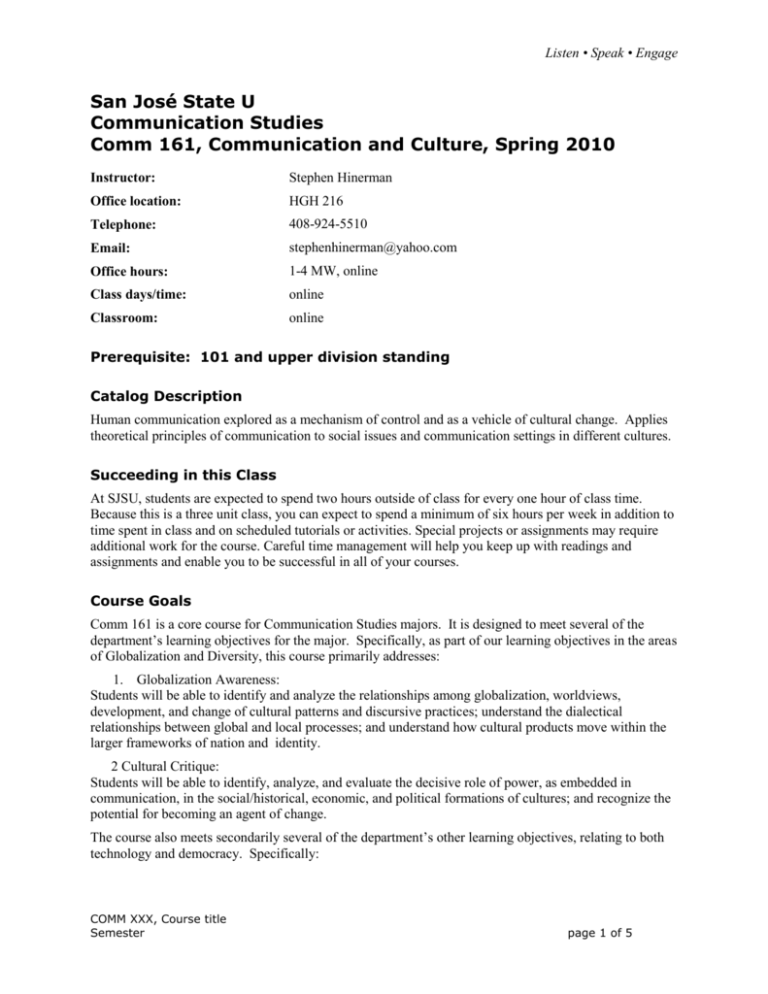
Listen • Speak • Engage San José State U Communication Studies Comm 161, Communication and Culture, Spring 2010 Instructor: Stephen Hinerman Office location: HGH 216 Telephone: 408-924-5510 Email: stephenhinerman@yahoo.com Office hours: 1-4 MW, online Class days/time: online Classroom: online Prerequisite: 101 and upper division standing Catalog Description Human communication explored as a mechanism of control and as a vehicle of cultural change. Applies theoretical principles of communication to social issues and communication settings in different cultures. Succeeding in this Class At SJSU, students are expected to spend two hours outside of class for every one hour of class time. Because this is a three unit class, you can expect to spend a minimum of six hours per week in addition to time spent in class and on scheduled tutorials or activities. Special projects or assignments may require additional work for the course. Careful time management will help you keep up with readings and assignments and enable you to be successful in all of your courses. Course Goals Comm 161 is a core course for Communication Studies majors. It is designed to meet several of the department’s learning objectives for the major. Specifically, as part of our learning objectives in the areas of Globalization and Diversity, this course primarily addresses: 1. Globalization Awareness: Students will be able to identify and analyze the relationships among globalization, worldviews, development, and change of cultural patterns and discursive practices; understand the dialectical relationships between global and local processes; and understand how cultural products move within the larger frameworks of nation and identity. 2 Cultural Critique: Students will be able to identify, analyze, and evaluate the decisive role of power, as embedded in communication, in the social/historical, economic, and political formations of cultures; and recognize the potential for becoming an agent of change. The course also meets secondarily several of the department’s other learning objectives, relating to both technology and democracy. Specifically: COMM XXX, Course title Semester page 1 of 5 Listen • Speak • Engage 3 Information literacy: Students will demonstrate competence in traditional and emerging forms of communication technology as relevant to this discipline and human communication. 4 Criticism Students will develop and apply analytical skills for researching and evaluating different forms of communication 5 Social Responsibility: Students will understand the dimensions of social responsibility and community engagement as obligations of democratic citizens. Course Learning Objectives For each of these learning objectives, indicated in 1-5 above, I will provide you with readings, assignments, activities and feedback that will help you with your competencies. I will assess student learning on each learning objective with specific evaluation as noted below. We will ground our learning by examining the theoretical relationship between communication and culture. This will provide us with the basic vocabulary for the course. The learning activity will be the reading from the textbook, Introducing Cultural Studies, and online lectures. We will be taking an exam which will test your learning which covers these concepts. LO 1: Globalization Awareness will be grounded in readings and discussions for our books, and by students own investigations in writing. Global Paper is particularly relevant to assess this. LO 2: Information Literacy will be assessed in research needed for both Online Discussions and Group Project and Global Paper. LO 3: Criticism will be assessed in the writing in both the Group Paper and Global Paper. LO 4: Social Responsibility will be assessed by Online Discussions and also in Global paper. Required Texts and Readings Textbooks Lawrence Grossberg, Ellen Wartella, et al, Media Making: Mass Media in Popular Culture, Sage paperback, 2006 ISBN: 0761925449 Ian Klaus, Elvis Is Titanic, Vintage paperback, 2007.u Farhad Manjoo, True Enough: Learning to Live in a Post-Fact Society, John Wiley and Sons, 2008 ISBN 9780470050101 Allegra Stratton, Muhajababes, Melville House Publishing, 2008, ISBN 781933633503 Rob Walker, Buying In: The Secret Dialogue Between What We Buy and Who We Are, Random House, 2008, ISBN: 9781400063918 Kirszer, Laurie G. and Stephen Mandell, The Pocket Wadsworth Handbook, 2009 MLA Update Edition, 4th Edition. ISBN 1439081816 COMM XXX, Course title Semester page 2 of 5 Listen • Speak • Engage Library Liaison Susan Klingberg is the library liaison for Communication Studies. Contact her at Susan.Klingberg@sjsu.edu with questions you may have about library research. Dropping and Adding You are responsible for understanding the policies and procedures about add/drops, academic renewal, and similar topics found at sa.sjsu.edu/student_conduct. Assignments and Grading Policy All papers should have references using APA format. The website http://owl.english.purdue.edu/ will give you an introduction to the APA style sheet. (Assignments subject to adjustment by professor) 1. Online discussions: In ten weeks of the term, there will be discussion questions. Students will be expected to reply in 400500 word posts to a question asked by the professor, and then reply (on a different day) to student responses in posts also of 400-500 words. These questions will address tying the concepts under discussion (including culture, ideology, identity, representation, power, hegemony, ethnicity/gender/class constructions, and globalization). Posts are graded on the degree to which students show understanding of the reading, how that is referenced in the writing, and how students engage the issue in a thoughtful manner. 2. Group Project Students will work in groups on a project that will examine how identity is shaped in a particular media. The papers will be posted online in discussion areas so they can be responded to by others in the class. Each group will find a media “event” online (or make one available online). This can be a video presentation, online site, music piece, advertisement, etc., The group will be charged with writing a group paper that illustrates how the particular artifact articulates culture, identity, ideology and gender/ethnicity. (1250 words) 3. Global Paper Students will individually discuss a particular “problem” they have identified concerning globalization. This should be an issue of global concern (such as war, environment, technology, capital accumulation, politics, etc.) that is manifested in a specific event or site. For instance, one could look at the ipod as a piece of global technology which raises issues about globalization, the politics of information, identity formation, etc. Finally, students should address how this issue might inform their everyday life, and what implications they draw from this concerning their own future. (1000 words) 4. Exams There will be four online exams which address the basic concepts from the main textbook. They may be multiple choice, short answer, essay in form. GRADING: Postings: 40 points each week x 10 weeks: 400 points COMM XXX, Course title Semester page 3 of 5 Listen • Speak • Engage Group Project: 100 points Paper: 100 points Exams: 50 points each times 4 exams: 200 points Grading will be done on a curve. The total highest point totals in the class will be awarded A’s, and on down depending on the total. The overall GPA of the class should be between 2.5 and 3.0. University Policies Academic integrity You must be familiar with the University’s Academic Integrity Policy available at sa.sjsu.edu/student_conduct. “Your own commitment to learning, as evidenced by your enrollment at San Jose State University and the University’s integrity policy, require you to be honest in all your academic course work. Faculty members are required to report all infractions to the office of Student Conduct and Ethical development.” I will not tolerate instances of academic dishonesty. Cheating on quizzes or plagiarism (presenting the work of another as your own, or the use of another person’s ideas without giving proper credit) will result in a failing grade and sanctions by the University. For this class, all assignments are to be completed by the individual student unless otherwise specified. “If you would like to include in your assignment any material you have submitted, or plan to submit for another class, please note that SJSU’s Academic Policy F06-1 requires approval of instructors.” Campus Policy in Compliance with the Americans with Disabilities Act If you need course adaptations or accommodations because of a disability, or if you need to make special arrangements in case the building must be evacuated, please make an appointment with me as soon as possible, or see me during office hours. Presidential Directive 97-03 requires that students with disabilities requesting accommodations must register with the DRC (Disability Resource Center) to establish a record of their disability. Student Technology Resources Computer labs for student use are available in the new Academic Success Center located on the 1st floor of Clark Hall and on the 2nd floor of the Student Union. In addition, computers are available in the Martin Luther King Library. The COMM Lab, located in Clark Hall 240, also has a few computers available for student use. A wide variety of audio-visual equipment is available for student checkout from Media Services located in IRC 112. These items include digital and VHS camcorders, VHS and Beta video players, 16 mm, slide, overhead, DVD, CD, and audiotape players, sound systems, wireless microphones, screens and monitors. COMM Lab The COMM Lab is located in Clark Hall 240. Tutors for the lab are recruited from well-qualified communication studies graduate and upper division students. The Lab provides resources for enrichment and assistance for those enrolled in all Communication Studies classes. Lab hours vary by semester and are posted on the COMM Lab wiki. available at commlab.pbwiki.com. Support for the Lab is provided by enrollments in COMM 80. COMM XXX, Course title Semester page 4 of 5 Listen • Speak • Engage Learning Assistance Resource Center The Learning Assistance Resource Center is designed to assist students in the development of their full academic potential and to motivate them to become self-directed learners. The center provides support services, such as skills assessment, individual or group tutorials, subject advising, learning assistance, summer academic preparation and basic skills development. The Learning Assistance Resource Center is located in Room 600 in the Student Services Center. SJSU Writing Center The SJSU Writing Center in Clark Hall 126 is staffed by professional instructors and upper-division or graduate-level writing specialists from each of the seven SJSU colleges. The writing specialists have met a rigorous GPA requirement, and they are well trained to assist all students at all levels within all disciplines to become better writers. More information available at sjsu.edu/writingcenter. Incompletes: No incompletes are given in the class, except when students complete 75% of the course work AND additionally have a valid verified documented medical emergency. COMM XXX, Course title Semester page 5 of 5
